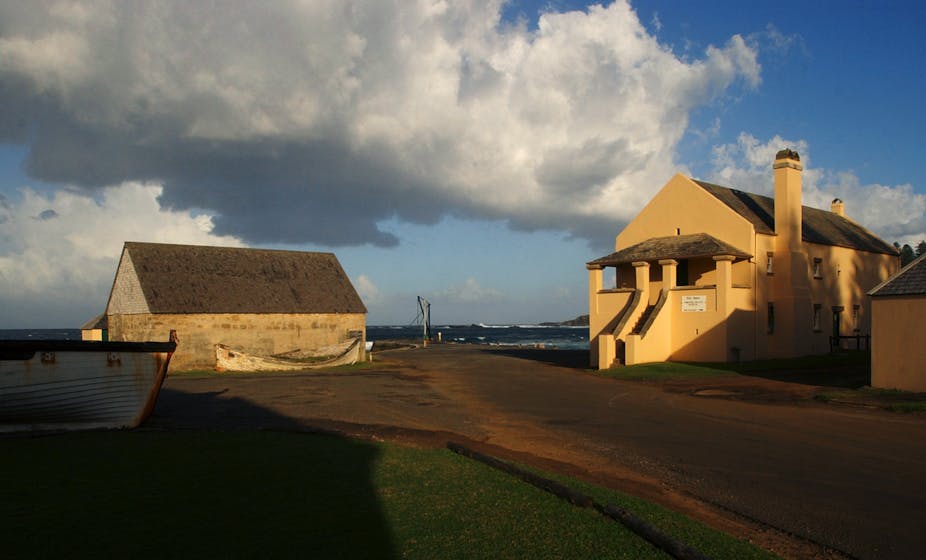Last week, both houses of Australian Parliament passed the Norfolk Island Legislation Amendment Bill, which removes the limited form of self-government Norfolk Island has possessed since 1979.
The passage of this bill marks a significant shift in relations between the tiny island and the mainland, placing Norfolk under similar governance arrangements as Australia’s other offshore territories, extending Australian laws, social security and taxation to the island.
A week earlier on May 8, 70% of the island’s eligible voters voted “yes” to a loosely-worded local referendum question that emphasises the island community’s rights to self-determination and desire to be consulted about their future political status.
Though the referendum is non-binding, many of the island’s 1400 residents interpret the result as a strong repudiation of Assistant Infrastructure and Regional Development Minister, Jamie Briggs’s claims that most island residents support the removal of self-government.
Norfolk’s governance changes are part of a wider, longstanding struggle over governance between island residents and Canberra. Where do the origins of these struggles lie?

Norfolk and Australia’s strained relationship
Norfolk’s isolation guarantees its physical separation from the Australian mainland – but it has also maintained a degree of political and cultural distance. This isolation is a product of its historical role as a home to the Pitcairn Islanders, a group of Anglo-Polynesian descendants of the mutineers of the HMAV Bounty who were resettled on Norfolk in 1856.
The island was a British territory when this group settled and remained so when the Australian states federated in 1901. The island was transferred to Australia in 1914, but for decades after, the descendants of the Pitcairn settlers claimed stronger identification with the United Kingdom than with their Australian neighbours.
Today, the island’s population also includes a majority of Australians and New Zealanders. Most Norfolk residents are more closely connected with the Australian mainland due to education, family or work links. I’ve worked as a researcher on Norfolk Island for many years and I often hear residents voice their mistrust of the Australian state and its intentions toward the island.
Mistrust of Australia has its origins in recent and distant governance disputes between islanders and mainland authorities. The political history of Norfolk Island since the arrival of the Pitcairn Islanders is scattered with such disputes, the most pervasive of which is a 150-year long quarrel over the original conditions of the Pitcairners’ settlement of Norfolk.

Echoes of a gift
When the Pitcairn Islanders were resettled on Norfolk Island in 1856, the head of each family was given a free Crown grant of land and more was handed out to marrying couples over time.
While islanders today are largely united in characterising these initial Crown grants of land to their ancestors as gifts, they have long debated among themselves and with various Australian and British government officials over the pivotal question of whether Queen Victoria, the highest authority in the British state, also gave the entire landmass of Norfolk Island to their ancestors when they settled the island.
From as early as 1857, some islanders appealed for greater local control over law and administration of the island by claiming that all of Norfolk was originally given to their ancestors and that it should be controlled locally by those it was intended for.
Such claims were aired again in 1896 when the measure of self-government they had possessed since settlement was revoked, and again throughout the period between 1896 and 1914 as the British government incrementally transferred its authority over the island to Australia against the wishes of the community.
These claims were tenacious because islanders believed that a formal cession document existed. This document was supposedly taken from the Pitcairn settlers soon after settlement. Various speculations regarding its content fuelled Islanders’ initial beliefs that Norfolk was rightfully theirs. No document of this sort has been found, and islanders’ claims have been consistently refuted by Australian authorities.
Despite having limited purchase outside of the community, these claims were strategically important in generating local support for self-government, which was finally awarded to the island in 1979.
Self-government on Norfolk Island arose from a belief among Canberra legislators that the Australian government could not adequately cater to the political needs of an island that was physically remote from the centre of political power. Providing local representation and a degree of political and economic autonomy, self-government quelled local unrest concerning the administration of the island and, for better or worse, kept ‘Australian society’ (including Australian taxation, welfare and government) at arm’s length.
Of course, Norfolk Islanders today have more immediate points of contention with the Australian government than one that began more than 150 years ago, such as whether last week’s governance changes affect their traditional system of land transmission and local business. Nevertheless, few gripes have been so persistent, and few encapsulate a shift from local autonomy and representation to more distant forms of control so poignantly.
Tensions continue
Like any healthy political community, local views regarding governance have always been diverse. While recent debate over the island’s future has focused on practical demands of the present, such as financial sustainability, upgrading infrastructure and on the pros and cons of extending Australian tax and services to the island, Norfolk Islanders do not consider these changes in a cultural vacuum.
Despite the undoubted close ties that island residents have with Australia, and indeed the growing economic necessity of a closer relationship with the mainland, a complex history lies behind last week’s changes to Norfolk’s governance. For Pitcairn-descended islanders in particular, these changes are reminiscent of longstanding conflicts that date back as far as their ancestors’ settlement.

